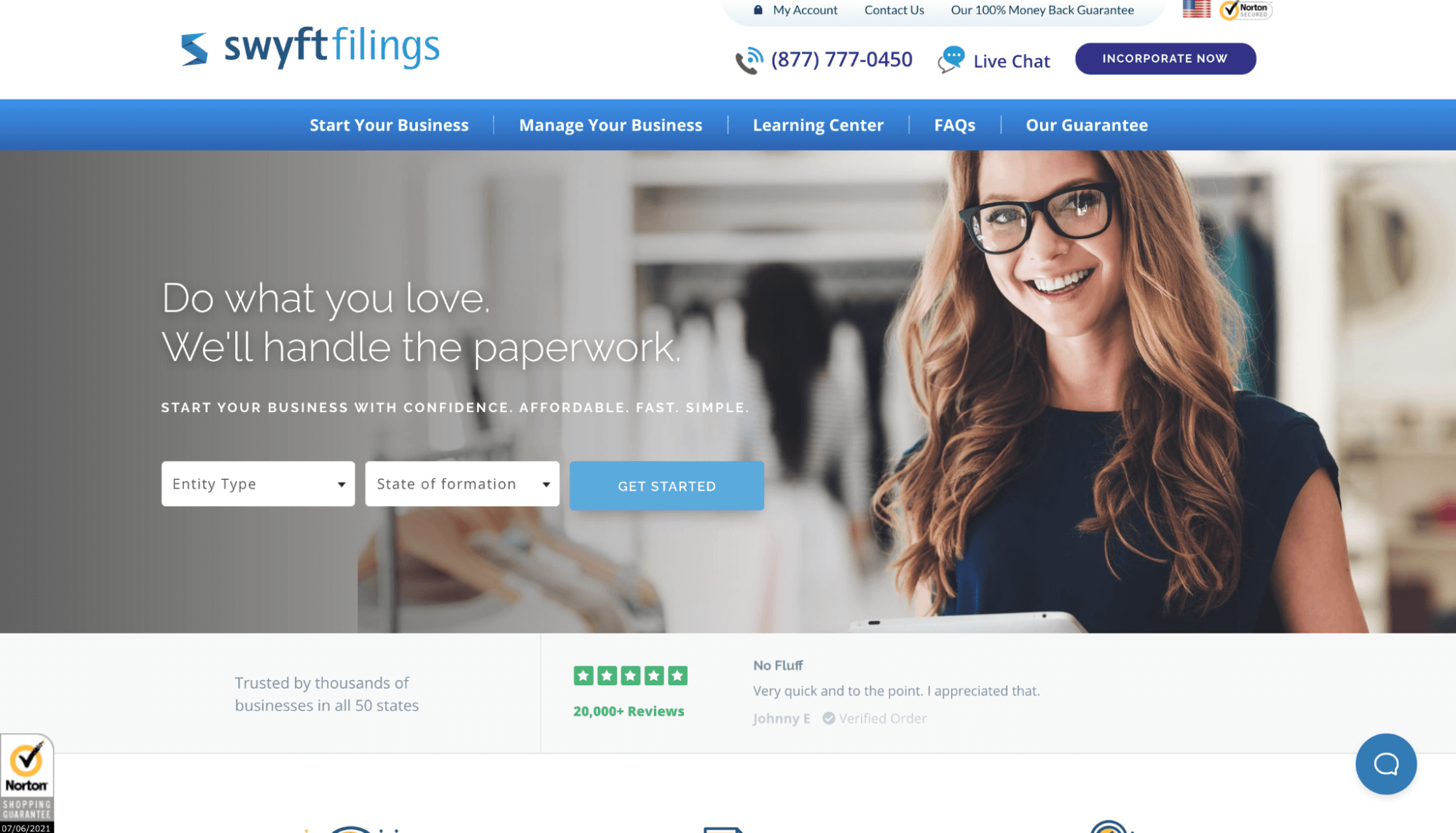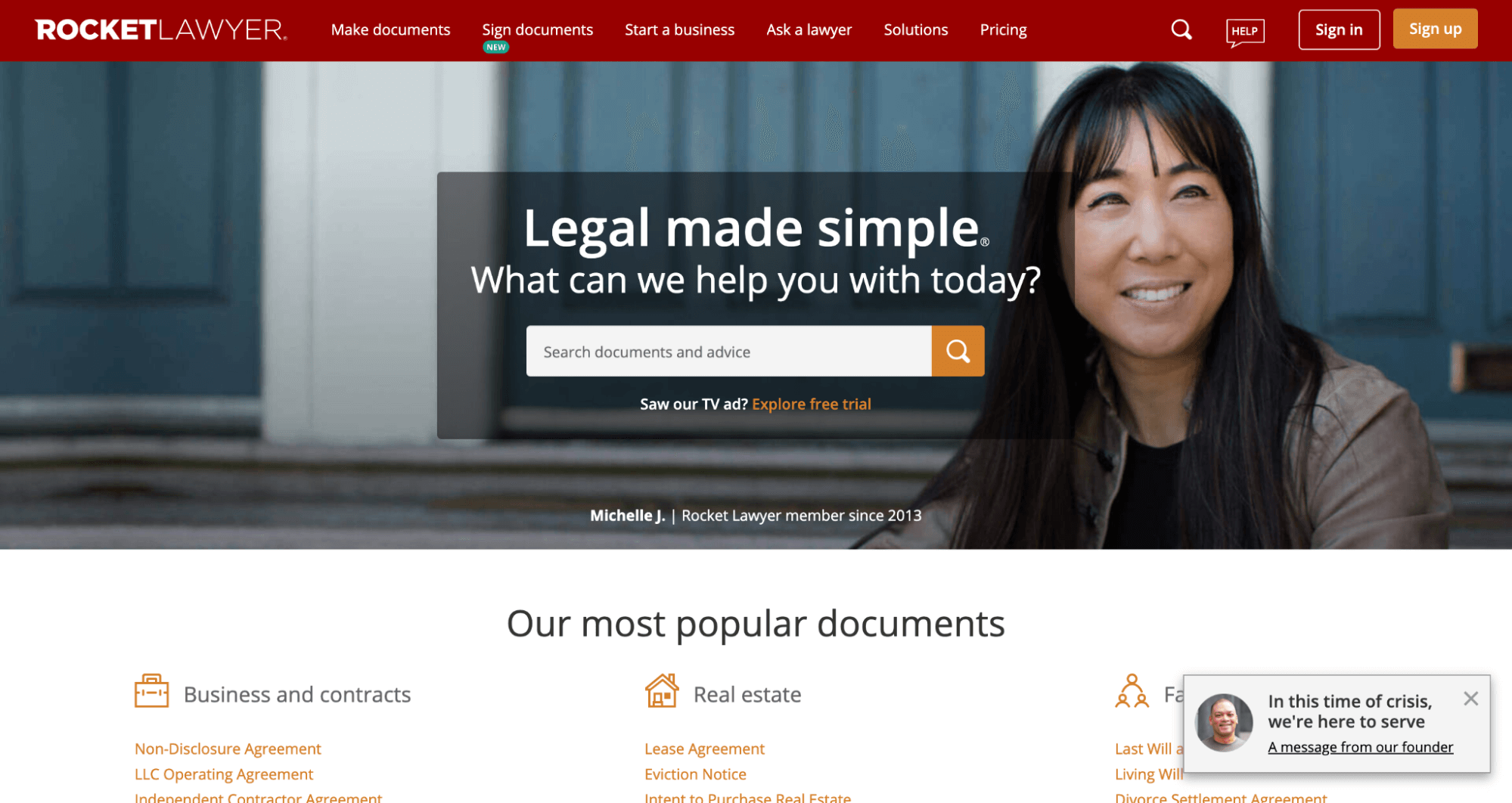You might be wondering whether you should register your business as a DBA or an LLC. But the thing is: It really isn’t an either/or choice.
While both options allow you to do business under a different name—one that’s different from your legal one—an LLC is a corporate business structure whereas a DBA is just a nickname for your already established business.
In this DBA vs. LLC article, I’ll detail the nuances of both acronyms to help you understand how they work and when to use them.
What are DBA and LLC?
Before decoding basics, let’s define and understand what we mean by a DBA and an LLC.
What’s a DBA?
DBA is an acronym for “Doing Business As.”
It’s a fictitious name, trade name, or assumed name that you can use to operate under a name different from its legal name. For instance, my legal name is Lars Lofgren, but I can operate my marketing business as QuickSprout—provided I file for a DBA. Starting a DBA permits me to do business as a sole proprietor or an LLC.
Mind you, filing a DBA won’t create a business entity. But it’ll allow you to operate under a different name than your personal name. Think of it as an official registration of the business name you use to run your company.
Moreover, a DBA allows you to change your name and business legally with minimal formality. Opening a business bank account and collecting payment in your business name is also possible.
The main disadvantage for business owners, however, is the lack of limited liability provisions. With a DBA, your business assets won’t receive any protection, so you’re obligated to repay any losses or penalties on behalf of your company.
What’s an LLC?
An LLC or a Limited Liability Company is a business entity that operates as a distinct legal entity separate from its owner. This gives you limited liability protection, meaning you won’t be responsible for any losses or fraud your business experiences—unlike a DBA.
It also offers more tax flexibility, letting you choose whether you want to be taxed as a sole proprietor, partnership, or corporation.
Even though an LLC requires more formalities than a DBA, they have fewer restrictions than corporations. For instance, an LLC must be managed by members or a manager. While the members are the owners of the company, a manager may or may not be a member.
When you open an LLC, you have to conduct business under a legally registered name. Precisely why it’s best to perform a name check on the state and federal level. You can see our list of the best LLC services here for more information.
The Basics of DBA vs. LLC
Here, I’ll discuss some crucial factors from an entrepreneur’s viewpoint and how well an LLC and or a DBA meets them.
Personal Liability Protection
Registering a DBA will hold you personally responsible for all the obligations of your business. In other words, your personal assets can be confiscated to cover any outstanding debts.
On the other hand, an LLC provides liability protection. This means that if someone were to sue your LLC, you won’t be held personally liable, and as such, individual assets like your bank account, car, home, or anything else will remain protected from creditors.
Formation
The good news is both DBAs and LLCs are simple to form and include straightforward steps like filing paperwork with the state and paying a filing fee.
The formation procedures and fees for LLCs and DBAs may vary slightly from one state to another. But considering a DBA isn’t a formal corporate structure, the costs of registering one are generally lower than starting an LLC.
According to Entrepreneur, filing a DBA requires you to pay a fee ranging from $10-$100, while NOLO states forming an LLC costs about $100-$800. You may also have to hire lawyers for legal advice because the legal and tax complications associated with an LLC are generally more complex.
The most obvious bureaucratic difference between a DBA and an LLC is that the former involves filing renewal paperwork annually or biannually—something that you won’t have to worry about with LLCs. Forgetting to renew your paperwork will leave your company name up for grabs. But once you do, you’ll be able to carry on with business as usual.
Note: After forming an LLC, you have to treat your company as a separate entity, which is why following corporate formalities and drawing a clear line between your business assets and personal assets is vital. The last thing you want is to lose your liability protection.
Management
A DBA is meant to be simple and flexible. You can start operations without having to prepare a formal statement of the business management structure. Contrarily, running an LLC needs to be done according to various rules and regulations.
LLCs are equally flexible. You can give all LLC members equal rights and responsibilities, or you can restrict management functions to certain members only—the choice is yours to make.
Taxation
Tax considerations are probably the most crucial factor when making the DBA vs. LLC comparison.
Your applicable taxes and filing requirements won’t change if you choose to register a fictitious business name. So if you own a sole proprietorship, you’ll continue reporting your income and losses on your personal tax return just like you did before after registering for a DBA. It’s the same for corporations.
If you decide to form an LLC, you’ll have new tax considerations to consider.
You’ll have to first file with your state tax agency and the IRS, then decide if you want to opt for corporate tax treatment. Depending on your business and state, you may be liable to pay franchise taxes as well.
Banking
In both cases, you can make financial transactions under the names of your registered companies instead of your personal name.
With a DBA, partnerships and sole proprietorships can deposit checks and accept payments made out in the business’s name to any DBA-associated bank account. It’s the same for LLC—all you have to do is open a bank account using your LLC name, and you can accept checks made out to your company‘s name.
5 Tools to Improve DBA vs. LLC Incorporation
Using incorporation formation services can be extremely helpful to form your business without the hassle. Below, I’ve narrowed down the five best options available on the market.
IncFile

IncFile is one of my favorite incorporation services for several reasons, but unparalleled affordability takes the top spot.
Its incorporation services start at $0, where you only need to pay the state filing fees. Over 500,000 businesses have used this service and are all praises for IncFile’s efficient and quick service.
You also get several amazing features like company name verification, incorporation article preparation and filing, lifetime support, free tax consultation, and a DBA filing offering. Its paid packages include services like corporate bylaws, organizational meeting minutes, EIN filings, business contract templates, and more.
Swyft Filings

Swyft Filings has been helping thousands of small- to medium-sized business owners to form LLCs for years.
Not only is the service incredibly user-friendly, but it also offers great customer support and diverse pricing options to suit every budget. It’s fast and has an easily accessible service department, making it ideal for DBA filing. Besides, a 10-minute setup and 1-2 weeks turnaround time are definitely hard to beat!
The fact that Swyft Filings is more than happy to iron out all the nitty-gritty, including capital-raising options and tax policies, is another plus.
Rocket Lawyer

Rocket Lawyer has quickly established itself as an entrepreneur favorite by helping them get in touch with nearby lawyers in their state.
It strives to do A to Z work and take over all the legal work involved in incorporating a business, regardless of whether it’s an LLC, partnership, sole proprietorship, or corporation. From hiring an attorney for document review to creating contracts to filing a DBA, you don’t have to worry about anything at all.
It has successfully provided its services to nearly 20 million customers, which considering it was founded in 2008, is a relatively short period of time.
What’s more, Rocket Lawyer offers a money-back guarantee as well as a seven-day trial for your peace of mind.
MyCorporation

MyCorporation is another excellent option for small businesses. Having been around for over two decades, they have since helped form and grow over 1 million businesses across all U.S. states.
Using this incorporation service is surprisingly simple—all you have to do is decide the type of entity, choose your state, and answer some questions. MyCorporation will take over from there. A highly-trained customer support team is also available to help you via phone, mail, or live chat.
In addition to DBS filing and incorporation procedures, you can also opt for additional services like trademark filings, copyright applications, and business licenses, to name a few.
BizFilings

Although BizFilings is one of the more expensive services on my list, it still offers a decent value-to-cost ratio.
It gives entrepreneurs access to several interactive tools and resources to help them with business planning and preparation. For instance, instead of having the user go through a laundry list of features and subscription plans, it offers a unique incorporation wizard to give them customized recommendations based on their requirements.
This intuitive setup process makes BizFilings super easy to use and navigate for even the least-experienced entrepreneur. Additionally, their business formation packages include a six-month registered agent service that can be seriously helpful to start your business with confidence.
3 Tricks for Structuring Your New Business Expertly
When setting up a business, you have to first understand how to structure your new business like a pro. Doing this right will not only help you score more funding but also meet tax requirements to the T.
To set you up for success, here are my top three tips:
Know that Becoming an Operating Entity is Always Advantageous
It’s best to select and establish an operating entity like an LLC or a C-Corp to conduct your business.
Operating as a sole proprietor is easier, yes. But it also exposes you to the worst of everything. You don’t get legal liability protection and have to deal with restrictive tax rates and probably the lowest chance of future sellouts.
Setting up an operating entity puts you in a completely opposite—and certainly more favorable—position.
Keep Your Business Property Separate From Your Intellectual Property
If you think your business doesn’t have any intellectual property right now, think again. Your phone number and website address are exactly that.
Suppose your company is hit with a frivolous lawsuit, which you unfortunately lose. Now, if your company owns your phone number or website address, the person who sued you can legally take over your phone number and website address to benefit from your reputation.
To avoid these situations, ensure you own all your business’s intellectual property and then license it to your business. This way, these assets will be treated as separate from your business in the event of any problems and may also help reduce tax.
Choose Your Business Name With Care
Although you may consider this strategy subjective, human bias is a reality—even where funding is concerned.
Traditional lenders and banks tend to fund certain types of businesses more than others. Precisely why you should be cautious when naming your business. For example, all else being equal, lenders prefer financing a marketing or management company more than a real estate business as the perceived risk is way higher in the case of the latter.
This doesn’t mean you should drop your real estate company. Instead, the idea here is to maneuver around the stigma that may be strong enough to get you rejected.
Avoid putting yourself at a disadvantage and select a company name that isn’t overtly real estate-related—or anything else that may lower your chances of getting financed.
What to Do Next
That was everything to know about the DBA vs. LLC debate.
Even if you want to have a brand name that’s different from your company name, you can start building your business by applying for an LLC.
The next steps on your agenda should include opening a business bank account and setting up your accounting, payroll, and other systems to start operations. I highly recommend creating a business plan if you don’t have one already to smoothen your business journey.
Here are a few more QuickSprout articles to help you plan your first year in business:
- https://www.quicksprout.com/how-to-write-a-business-plan-for-your-startup/
- https://www.quicksprout.com/how-to-start-a-business/
- https://www.quicksprout.com/best-business-formation-services/
from Quick Sprout https://ift.tt/3dN6cIz
via IFTTT
